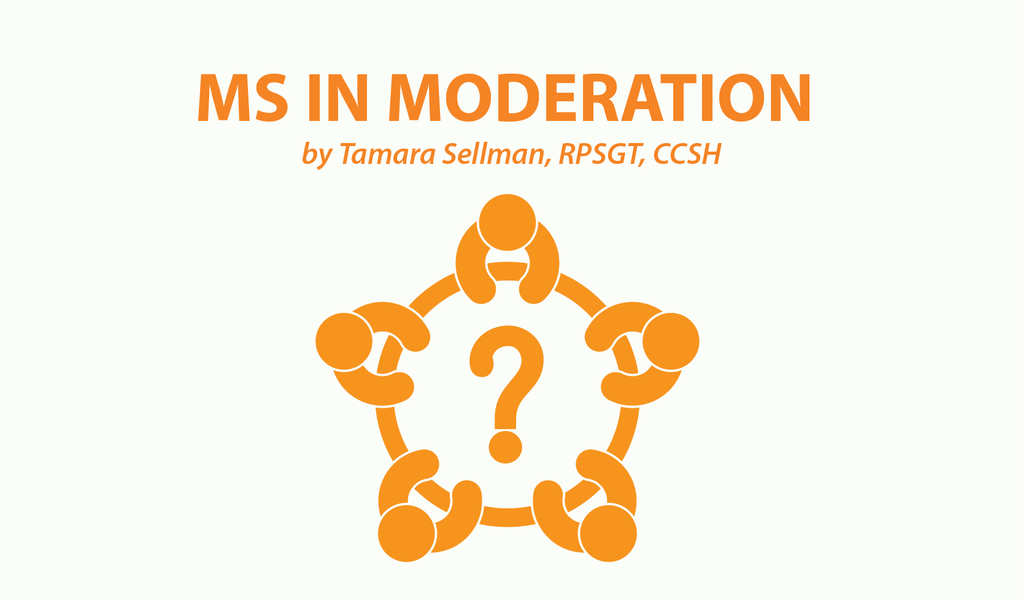The MS Alphabet: Solu-Medrol, Side Effects, Scanning Speech, and Other ‘S’ Terms (Part 2 of 5)
Written by |


Editor’s note: Tamara Sellman continues her occasional series on the “MS alphabet” with this column referencing terms starting with the letter “S.” Second in a series of five.
Symptoms of MS
Speech problems
It’s estimated that nearly half of all people with MS struggle with speech at some point in their lives.
Generally referred to as dysarthria, dysphonia, or dysphasia, speech problems in those with MS tend to revolve around the rhythm and pace of speech as well as challenges with word-finding.
Dysarthria involves disruptions to the motor muscle components of speech, while dysphonia affects voice sound quality and volume. Dysphasia involves memory-related issues that describe a person’s struggle to retrieve words and names they ordinarily know and use. It can also reflect a struggle with tracking and comprehending more complex conversations.
Lesions in the brain stem, in particular, can lead to disruptions to normal speech patterns that can be mild or severe enough to make it difficult to speak or to be understood.
Those with speech problems frequently experience other problems related to brain stem lesions, such as head shaking, tremors, and incoordination.
Slurring of words is fairly common among people with MS. It’s caused by muscular weakness or problems with coordination in the tongue, lips, mouth, and cheeks.
Slurring gives the illusion that the speaker is “under the influence,” and is so convincing that some people with MS have to explain that they are not drunk or using recreational drugs.
Other kinds of speech problems include:
- Scanning or staccato speech, which describes arrhythmic speech that draws out the spaces between words and even within the syllables of the words themselves, contributing to the overall harmony of language as it is spoken.
- Nasal speech, which refers to changes in the upper airway that alter the sound of one’s speech to make it sound more nasal in origin.
- Problems with control of speech volume, pitch, or tone.
- Breathiness, which is caused by poorly coordinated vocal cords.
- Hoarseness, when vocal cords tighten excessively.
MS abbreviations
SPMS (secondary progressive multiple sclerosis)
Secondary progressive multiple sclerosis (SPMS) is a stage of progressive MS thought to follow an initial relapsing-remitting multiple sclerosis (RRMS) diagnosis.
Those with RRMS who experience a progressive worsening of function, which includes disability, are likely to become diagnosed with SPMS.
According to the National Multiple Sclerosis Society, SPMS may be further delineated as active, due to relapses and/or MRI evidence of new disease activity, or inactive, as shown by objective measures of worsening over time, with or without relapses or progression.
Common MS terms
Side effects
This refers to typically undesirable, adverse or “untoward” effects of a therapy or medical treatment. Many MS therapies, though beneficial, have side effects, such as headaches, insomnia, gastrointestinal problems, or unwelcomed sleepiness.
The biology of MS
Suppressor T-cells
These cellular members of the immune system function by turning off immune system responses in normal healthy individuals. For those with MS, the noticeable absence of suppressor T-cells during active inflammatory episodes of MS has been confirmed by research.
MS treatments
Solu-Medrol
This potent corticosteroid (also known as methylprednisolone) is often administered by emergency department personnel to help ease inflammatory processes that occur in patients during acute attacks of MS, which may lead to losses in limb function, sight, or other critical body functions.
In acute attacks, the severity of MS symptoms is amplified, but the use of Solu-Medrol (sometimes referred to as IV Solu-Medrol) has been shown to be effective in shortening disease course.
This steroid is given to patients either intramuscularly or intravenously, and side effects occur in about a third of patients. These include:
- Enhanced appetite
- Fluid retention
- Insomnia
- Irritability
- Muscle weakness
- Nausea
- Reflux.
Solu-Medrol is used primarily for urgent treatment and is not often used in the long term.
Those with long-term use of methylprednisolone may experience thinning bones, joint problems, and weight gain as a result.
Do not abruptly discontinue use of this steroid as serious side effects can result.
***
Note: Multiple Sclerosis News Today is strictly a news and information website about the disease. It does not provide medical advice, diagnosis, or treatment. This content is not intended to be a substitute for professional medical advice, diagnosis, or treatment. Always seek the advice of your physician or other qualified health provider with any questions you may have regarding a medical condition. Never disregard professional medical advice or delay in seeking it because of something you have read on this website. The opinions expressed in this column are not those of Multiple Sclerosis News Today or its parent company, Bionews Services, and are intended to spark discussion about issues pertaining to multiple sclerosis.



John Weiss
When I was diagnosed with relapsing/remitting ms in 1984, there weren't any FDA approved treatments. My Neurologist monitored my symptoms annually until Avonex was approved, and I started using it. While the administration has changed significantly (it had to be mixed from powder at first) not much else changed until Biogen started offering Plegridy, which is a version that is taken biweekly. Unfortunately, I had a very bad experience with it. My MS symptoms worsened. I went back to Avonex and hoped my symptoms would improve. Fortunately, I returned to my previous condition. I can walk unaided, but my balance is uncertain. No running!
Kassin Victoria
John, i completely understand, I was diagnosed in’82, and didn’t use anything but cortisone whenever a rellapse came. I am fully mobile, but I don’t run either, I am currently aning from Copaxone to rituximab, have you tried any of your he newer treatments?
jim crowe
are there any assumptions i can make about ocrevus,such as improvement in walking,talking,balance(my primary problem),eye problems and many more......i was diagnosed in 1976 and have been anticipating some kind of breakthrough since...ocrevus was touted as a game changer;is it?....this(ms)malady,disease,condition or whatever moniker one applies to it, chops us down piece by piece,which enables you and i to appreciate another aspect of "abcense makes the heart grow fonder"
Greg
I have been diagnosed with MS and also have balance issues. Should I ever get pulled over for suspicion of "Driving under the influence" and have to walk a straight line, it may not go well and I may have some "Splaining" to do.